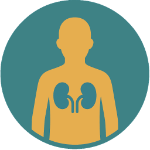Lifestyle and Yangsheng for Kidney Health
In Chinese tradition, caring for the kidneys goes beyond treating illness. It is part of everyday living, woven into the practice of yangsheng, or nourishing life. For people with Chronic Kidney Disease (CKD), or those hoping to prevent it, lifestyle choices are seen as one of the most powerful tools for maintaining health and slowing decline.
The kidneys are considered the storehouse of jing, the body’s essence. This vital resource is slowly used throughout life and cannot be easily replaced. Preserving it means avoiding habits that drain energy, such as chronic overwork, staying up late night after night, or placing the body under constant stress. In TCM, moderation is key. Balancing activity with rest, and effort with recovery, allows the kidneys to remain strong.
Everyday Kidney Care
- Get enough sleep and rest to preserve energy.
- Protect the lower back and feet from cold, especially in winter.
- Favor warming, nourishing foods like congee, ginger, and black sesame.
- Practice gentle exercises such as qigong, taijiquan, or walking in nature.
- Set aside quiet time to reduce stress and calm the mind.
- Avoid overwork, heavy alcohol use, and late nights.
Seasonal living is another important theme. The kidneys are associated with winter, when nature withdraws and rests. During colder months, protecting the lower back and feet from cold is thought to safeguard kidney yang, the warming and activating force of the body. Many people find benefit from warming foods such as stews, congee, or teas made with ginger and jujube, which are gentle supports for circulation and energy.
Exercise is best kept steady and moderate. Practices such as taijiquan and qigong help cultivate internal energy while reducing stress on the body. Standing meditation or gentle breathing exercises not only calm the mind but also strengthen the kidneys by encouraging deep, relaxed energy flow. Even walking in nature can support this balance, especially if done regularly.
Dietary habits deserve attention as well. Western medicine emphasizes controlling sodium, managing protein, and monitoring phosphorus and potassium in advanced stages of CKD. TCM dietary therapy complements this by recommending foods that nourish the kidneys, such as black sesame, walnuts, goji berries, and dark leafy greens. Overeating, too much alcohol, or very cold raw foods can burden digestion and indirectly weaken kidney function.
Emotional well-being is also part of lifestyle care. Fear and insecurity are traditionally said to injure the kidneys, while courage and steadiness strengthen them. Creating routines that reduce stress, such as daily quiet time, journaling, or practicing gratitude, can be protective. This is consistent with modern findings that stress hormones, when elevated long term, can damage many body systems including the kidneys.
Living with CKD is a challenge, but the principles of yangsheng offer a supportive path. By respecting rest, moving with moderation, eating with care, and cultivating emotional balance, it is possible to nourish kidney energy while working with medical treatment. These simple habits, drawn from centuries of practice, remind us that health is not only about what we avoid but also about the positive choices we make each day.
Vocabulary Guide
- Yangsheng (养生) – The art of nourishing life through balanced living, diet, and practices that support health.
- Jing (精) – Essence stored in the kidneys, linked with growth, reproduction, and vitality.
- Kidney yang (肾阳) – The warming, activating energy of the kidneys, related to vitality and warmth.
- Kidney yin (肾阴) – The cooling, moistening aspect of kidney energy, linked with fluids and nourishment.



